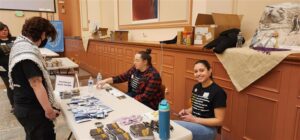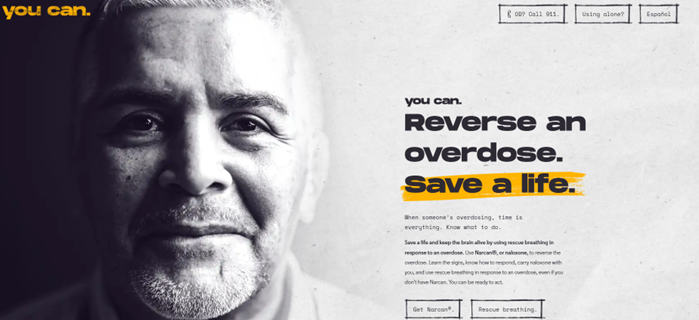Overdose fatalities continue to climb year-over-year within Massachusetts and nationally. The CDC reported that over 107,000 people in the U.S. died of a drug overdose in 2022, with over 75% of those involving an opioid. In 2022, the Massachusetts Department of Public Health estimated 2,359 overdose-related deaths in the state – a 2.5% increase from the previous year and 9.1% higher than the pre-pandemic peak in 2016.
To reverse current trends, we must build broad community capacity in overdose prevention and rescue. These skills are simple to learn and easy to perform—anyone can do them. This is the foundation of HRiA’s You Can initiative.
You Can Save a Life
HRiA recently launched the You Can Save a Life (or You Can) campaign at youcan.info. Funded by the Substance Abuse and Mental Health Services Administration (through the MA Department of Public Health), the You Can suite of resources is designed to build community-wide capacity to reduce deaths from overdose. Through a series of educational and storytelling videos, You Can focuses on disseminating these key messages and skills:
- Anyone can save a life by knowing the signs of an overdose and how to respond.
- Rescue breathing is a free and critical part of responding to an overdose.
The initiative is complemented by:
- Statewide distribution of fentanyl test strips and You Can branded materials to harm reduction providers by the MA Health Promotion Clearinghouse (a program administered by HRiA),
- Training in overdose rescue and prevention by HRiA’s BeHERE Training ,
- Collaboration with Safe Spot, a life-saving overdose detection resource for people who use drugs, and
- Partnership with advocates and organizations across the state.
You Can Week

As with all resources, their effectiveness requires audience awareness. To spread the word about these powerful tools the You Can team hosted a series of exciting activities to amplify the reach of the campaign during the week of March 4th:
- Community partners visits. The team visited the community partners who had helped develop the You Can branded materials, such as rescue breathing masks, lighters, pens, wallet cards, and buttons in English and Spanish.
- HRiA staff training. The team facilitated three overdose rescue and harm reduction trainings, where 94 HRiA staff members learned about the You Can resources and how to reverse an overdose.
- Community event. Over 100 people convened at the You Can Save a Life event in Boston on March 6th, including providers of harm reduction services and people with lived and living experience of substance use. Attendees explored the You Can website, picked up resources and You Can branded items (including fentanyl test strips), and heard from Stephen Murray and Kimber King of the Overdose Prevention Helpline.

Key Lessons from You Can
You Can’s lessons are simple and powerful.
You can use more safely. If you or a loved one uses drugs, here’s how to use more safely:
- Always use with someone (if alone, you can call the MA Overdose Prevention Helpline (now known as Safe Spot) for someone to be on the phone with you while you use).
- Test your supply with fentanyl test strips.
- Go low and slow. Start with a small amount of the drug and increase a little more at a time.
You can rescue breathe. Overdose happens when too many opioids cause breathing to be slowed or stopped. Rescue breathing simply means giving breaths to someone in a state of overdose to keep their brain and body alive.
- Tip the head back, pinch the nose, and give 1 breath into the mouth every 5 seconds.
- Rescue breathing can be done through a rescue breathing mask, an article of clothing, or direct mouth-to-mouth.
- Used alone or with Narcan, rescue breathing can prevent overdose fatality.
- Learn more: How to perform rescue breathing.
You can save a life. If someone overdoses while using drugs, here are the steps to respond:
- Call 9-1-1.
- Give 1 dose of Narcan (if you have it).
- Perform rescue breathing.
- If they don’t wake up after 3 to 5 minutes, give them a 2nd dose of Narcan.
- Keep rescue breathing until they wake up or help arrives.
Take Action
You Can is a celebration of the power of individual action and community commitment to stopping these preventable deaths.
As a public health organization, HRiA is committed to addressing this public health crisis by:
- Educating our staff on recognizing and responding to overdose,
- Understanding harm reduction and how it applies to our public health work,
- Challenging the harmful narratives that perpetuate drug-related stigma, and
- Helping organizations build capacity to address substance use and harm reduction needs.
We invite our partners to join in our commitment. Below are actions we can all take to build our own capacity to reverse overdose.
- Engage with a resource on the You Can website.
- Order rescue breathing masks and other You Can materials on the MA Health Promotion Clearinghouse website.
- Get trained on overdose rescue by the BeHERE Training team.
- Learn where you can get Narcan in your area.
